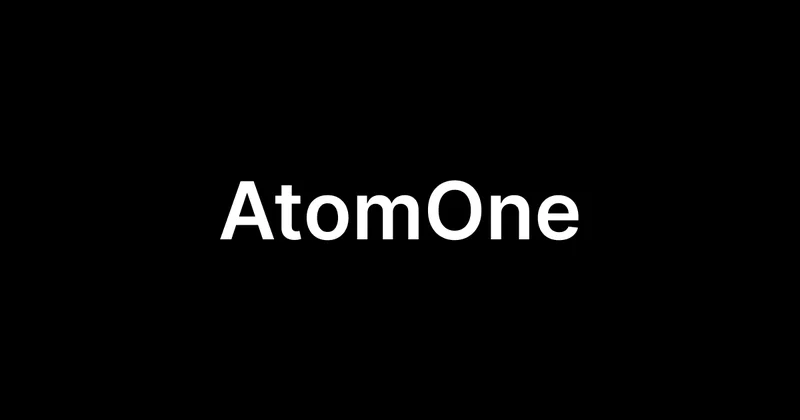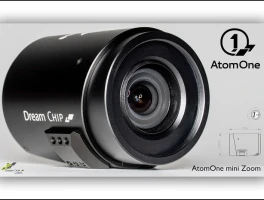You ever wonder what happens in a marketing meeting when someone realizes their brilliant, unique product name is already being used for something completely, fundamentally different? I picture a conference room. Someone in an expensive, ill-fitting suit says, "Let's call it the AtomOne!" and everyone claps. Then, months later, some intern scrolling through the web goes pale and whispers, "Uh, guys? You need to see this."
Because right now, we have two "AtomOnes" in the tech world. And they could not be a more perfect, more bitterly ironic metaphor for the two warring factions of the tech industry itself. One is building the future. The other is busy arguing about it.
When Hardware Still Had a Soul
The Atom That Sees
First, let's talk about the one that actually exists in the physical world. A German company called Dream Chip—a name that sounds like it was spat out by a 1980s cyberpunk novel generator—has been cranking out these tiny little cameras. Their flagship line is called, you guessed it, AtomOne.
And I gotta hand it to them, this stuff is genuinely cool.
Their new model, the AtomTwo, is smaller than a matchbox. I mean, literally. 29 by 29 millimeters. It weighs 55 grams. It's a spec of dust with a lens on it. But this spec of dust shoots in HDR, has a global shutter so sports broadcasts don't look like a jiggling plate of Jell-O, and has a wide-angle lens.
This is the kind of tech that changes how you see things. You can stick this on a referee's chest, on the bumper of a race car, on a tiny drone that can fly through a stadium. It gets you so close to the action you can smell the sweat. It's the kind of innovation that's tangible. You can hold it. You can see what it does. It solves a real problem: "How do we show people something they've never seen before?"
They even have one called the AtomOne Mini Zoom, which is slightly bigger but lets a director reframe a shot from a camera hidden behind a basketball hoop. It’s a slick, impressive piece of engineering designed to bring an audience closer together, to create a shared experience. It’s about unity of vision.
Remember that. Unity.
Crypto Civil War, or Just a Founder's Ego Trip?
The Atom That Divides
And then there's the other AtomOne.
This one you can't hold. You can't see what it does, not really. This AtomOne is a "minimal fork" of the Cosmos Hub blockchain.
Let me translate that from cryptobro-speak into English for you. The guy who co-founded the Cosmos crypto project, Jae Kwon, got into a massive public spat with the rest of the community he helped create. They held a vote—Proposal 848, if you're into collecting serial numbers of digital trainwrecks—about capping the inflation rate of their token, ATOM. Kwon was vehemently against it. He argued it compromised network security.
He lost the vote.

So, what does a visionary founder do when the democracy he helped build votes against him? Well, he takes his ball and goes home. Kwon announced he's forking the project. He's literally splitting the community and the code in two. The new version, his version, will be called AtomOne.
This is a bad idea. No, 'bad' doesn't cover it—this is a five-alarm dumpster fire of ego and ideology. Kwon’s own justification, delivered to The Block, is a masterclass in corporate doublespeak: "The objective of GovGen is to provide a forum to facilitate the forking and splitting of blockchains based on governance activity..."
Translation: "I'm building an entire platform dedicated to making it easier for people to storm off in a huff when they lose an argument."
This ain't about security, not really. It’s about control. It's about a founder who can't stand that his creation has grown beyond him. He's so wrapped up in the "first principles" of a system that barely a fraction of a percent of the global population understands or cares about, that he'd rather break it than see it change. They're fighting over inflation rates and network security, and for what? To secure a network that most people will never even...
Then again, who am I to judge? Maybe this fork is a brave stand for decentralization. Maybe I'm just a cynical old man who doesn't get it anymore. Maybe fighting over the abstract rules of a digital universe is a noble pursuit.
But I doubt it.
It's just exhausting. Trying to explain this stuff to normal people is impossible. It’s like trying to explain the theological differences between two obscure monastic orders to someone who just wants to know what time it is. The whole crypto space feels like a permanent, unending constitutional convention populated by people who think they're Thomas Jefferson.
The Battle for a Name: Hardware vs. Hot Air
One Name, Two Worlds
So you have two AtomOnes.
One is a tiny marvel of engineering, a physical object built by a team of people to solve a problem. It’s designed to bring millions of people watching at home closer to a shared reality. Its whole purpose is to unify a viewing experience.
The other is an abstract concept born from a public disagreement. It's a piece of code designed to split a community, to create a parallel reality for the people who didn't like how the first one was going. Its purpose is, by definition, division.
One AtomOne is building cameras you can put on a race car. The other is a group of developers arguing about the theoretical security model of their digital car, which has no wheels and doesn't actually go anywhere. Offcourse, they'll tell you it's the future of transport, you just have to believe hard enough.
It's the entire modern tech story encapsulated in a single, stupid, search-engine-optimization nightmare of a name. The builders versus the arguers. The engineers versus the ideologues. The people making tangible things, and the people making digital manifestos.
I know which side I think is actually accomplishing something.
So, Which One Actually Matters?
At the end of the day, it's pretty simple. The Dream Chip guys are shipping a product. It's a real thing that does a real job. In five years, their cameras will be even smaller, even better, and stuck in places we can't even imagine, showing us things we've never seen. Jae Kwon and his AtomOne fork? In five years, it'll be a forgotten footnote on a Wikipedia page about crypto infighting, another casualty in the endless, exhausting war over nothing you can touch.
Reference article source:

